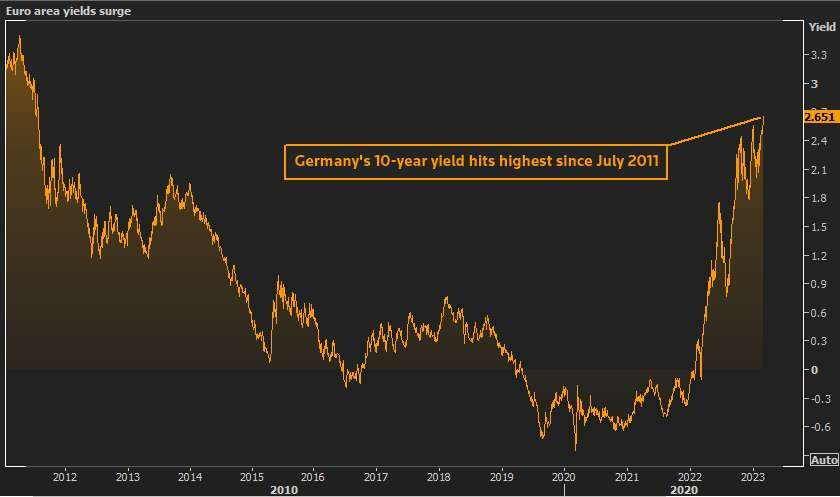
By Lawrence Delevingne and Samuel Indyk
(Reuters) – Wall Street indexes and global equities were mixed on Tuesday and bonds wrapped up a difficult month with further yield increases, as more evidence of stubborn inflation added to expectations that central banks will keep rates high.
The optimism that drove shares up and global bond yields down in January has ebbed this month, as data from around the world has pointed to economies and labour markets facing little in the way of strain from high inflation.
The concern now is less about a global recession and more over the prospect of there being little respite any time soon from higher interest rates.
“Markets will need to adjust to the Federal Reserve’s message that interest rates may need to go to higher levels and stay there for a longer period of time,” Wells Fargo Investment Institute’s Douglas Beath wrote in a note on Tuesday, adding that stock market volatility is likely in the near term.
In choppy trading on Tuesday, the Dow Jones Industrial Average fell 0.33%, to 32,781.38, the S&P 500 gained 0.28%, to 3,993.34 and the Nasdaq Composite added 0.55%, to 11,529.73.
U.S. consumer confidence declined again in February according to The Conference Board, while U.S. single-family home prices in December increased at their slowest pace since the summer of 2020, per the S&P CoreLogic Case Shiller national home price index.
Earlier on Tuesday, data showed France’s European Union-harmonised consumer prices rose to a record 7.2% in February, while Spain’s EU-harmonised 12-month inflation stood at 6.1%, up from 5.9% in January and above the 5.5% expectation from analysts polled by Reuters.
The pan-European STOXX 600 index fell 0.3%, still up 1.74% in February, its fourth positive month in five.
MSCI’s All-World index of global shares edged up about 0.1%, still around Friday’s seven-week low. The index is down around 2.6% this month, erasing some of January’s 7.1% gain, when shares rose on expectations that major central banks were close to the end of their tightening cycle.
Since then, a slew of U.S. and euro area economic data has reinforced the view that interest rates will rise further and stay high for longer.
U.S. two-year Treasury yields, the most sensitive to shifts in expectations for interest rates, have risen this month to almost 5%. This is their largest monthly rise for the month of February since 1981, according to Refinitiv data.
INFLATION BATTLE
BofA Global Research said in a note on Monday that the Fed may hike interest rates to nearly 6%, as strong U.S. consumer demand and a tight labour market would force the central bank to battle inflation for longer.
Fed funds futures are fully pricing in a 25-bps rate rise from the Fed next month, with around a 20% chance of a larger 50-bps hike.
It is not just U.S. markets that are reflecting a more sobering rate outlook. In Europe, two-year German bond yields are heading for their largest monthly rise for the month of February since 1991, while two-year UK gilts are heading for their biggest February rise since 2005.
Euro-denominated money markets on Tuesday predicted an ECB deposit rate of 3.975% by year-end, from 3.775% on Thursday last week.
ECB Chief Economist Philip Lane told Reuters that euro zone inflation pressures have begun to ease, but the European Central Bank will not end rate hikes until it is confident price growth is heading back towards 2%.
Preliminary euro area wide consumer price inflation data for February is due on Thursday, while investors will get more information on the state of the U.S. economy with U.S. ISM manufacturing and services survey data for February due on Wednesday and Friday, respectively.
“Fed officials are waiting for prior tightening of financial conditions to slow the U.S. economy, but it is increasingly possible that the maximum drag from tighter financial conditions is behind us,” Citi strategists said in a note.
The U.S. 10-year yield rose 1.6 bps to 3.938%, up more than 50 bps in February, its biggest monthly jump since September. Germany’s 10-year yield, the benchmark for the euro area, was virtually flat at 2.647%, its highest level since July 2011.
Graphic: German 10-year yield https://fingfx.thomsonreuters.com/gfx/mkt/dwvkdzzmlpm/Pasted%20image%201677585005543.png

In the currency market, sterling was last trading at $1.207, up another 0.1%, having jumped 1% on Monday after Britain struck a new trade deal with the European Union, brightening the outlook for the post-Brexit UK economy.
The euro was down 0.17% at $1.059, after rising 0.6% on Monday.
The dollar index, which measures the U.S. currency against a basket of peers, ticked up 0.1%, set to snap a four-month losing streak, having risen 2.6% in February.
Oil prices rose about 2% on Tuesday, erasing the previous session’s losses, as hopes for a strong economic rebound in China offset worries about U.S. interest rate hikes dragging down consumption in the world’s biggest economy.
U.S. crude rose 2.06% to $77.24 per barrel and Brent was at $83.95, up 1.82% on the day. [O/R]
Elsewhere, Chicago wheat futures were hovering near a 17-month low due to rain in parts of the U.S. winter wheat belt and optimism over a Russia-Ukraine export deal. [GRA/]
Gold added 0.7% to $1,829 an ounce.
(Reporting by Lawrence Delevingne in Boston, Samuel Indyk and Amanda Cooper in London and Ankur Banerjee in Singapore; Editing by Shounak Dasgupta, Deepa Babington and Ed Osmond)


